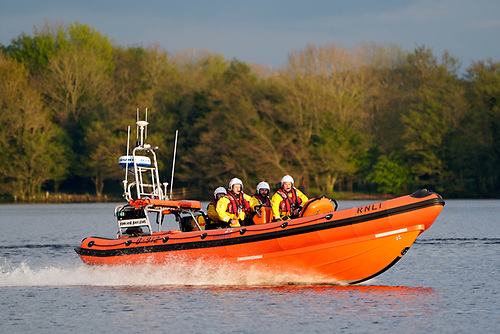#rnli – Two long-serving Newcastle RNLI volunteers have received awards from the charity for their tireless work and dedication to saving lives at sea. Deputy Launching Authority Joe McClelland and All Weather lifeboat crewmember William Wilson were presented with the awards at the station recently and the honour was well received among their colleagues at the lifeboat station. Between them the two men have given almost seventy years' service to the RNLI and neither of them have any plans to retire.
Joe McClelland has been involved with Newcastle RNLI since signing up as a teenager in 1966. He spent the next two years as shore crew before he moved onto the all weather lifeboat, where he spent the next 27 years as lifeboat man. When it came time to step down from the lifeboat crew, Joe did not leave the RNLI. Instead he stayed on at the station and put his invaluable maritime knowledge and experience to good use in the role of Deputy Launching Authority.
Joe is a mariner through and through, having been at sea for 42 years, with 30 of them serving as a Captain in the merchant navy. Reminiscing on his time with Newcastle RNLI Joe said, 'It was the done thing years ago to join the lifeboat crew when you were very young. The Newcastle lifeboat at time was the Liverpool class William and Laura and the Coxswain was Mickey Leneghan, a man we all looked up to and who was a legend around these parts. I lived in the harbour and the sea was in my blood.
Receiving the long service award is a huge honour for me and I will treasure it. So much has changed in the RNLI over the last 47 years that I've been involved with the RNLI. There is now a huge emphasis on training and rightly so. Not as many people are from maritime backgrounds but they have brought huge talent and skill to the crew and the RNLI places a huge emphasis on the training. I've seen a lot of things during my time as lifeboat crew and thankfully there has been a lot of happy endings and reunions but I also remember those who were lost at sea and their families.'
Also receiving his long service award was crewmember William Wilson, in recognition of his 20 years on the Newcastle lifeboat. William joined the lifeboat crew in 1994 when he was 26 years old. His father Will also volunteers with Newcastle RNLI and is currently station President. William has served as both inshore and all weather lifeboat crew but these days he has retired from the smaller lifeboat.
William commented, 'I always had an interest in search and rescue and I had the good fortune of joining the lifeboat crew just as the current all weather lifeboat Eleanor and Bryant Girling arrived on station, so there was huge excitement. We couldn't wait to get onboard and up to speed with all the equipment. My first major callout was to a fishing boat which had been lost in bad weather. I remember my adrenalin was pumping as we searched for the missing crewman for days. At that stage you realise that even when things are bleak, the importance of bringing closure to a family is a huge part of your job.
The RNLI is a very professional service and I love the fact that you are never finished learning. The background of the crew may have changed but the aims and values are still exactly the same and that is still saving lives at sea. I want to thank everyone involved with Newcastle RNLI for the honour and I hope we will see many more of these awards in the years to come.'































































